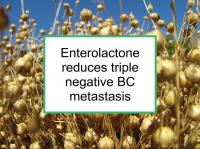Enterolactone is produced by microflora in the gut from lignans, phytoestrogens found mainly in the woody or fibrous tissues of a variety of foods, including seeds, whole grain products, and some fruits and vegetables. Lignans have been found to have both estrogen-dependent (ER+) and non-estrogen-dependent (ER-) anti-cancer properties.
Enterolactone influences biological mechanisms that retard breast cancer development. High circulating enterolactone levels have been linked to reduced breast cancer risk and improved survival. Enterolactone also increases the sensitivity of breast cancer cells to radiation, thereby potentially enhancing the treatment effects of radiotherapy.
Now a new study has reported enterolactone suppresses proliferation, migration and metastasis of triple negative (ER-/PR-/HER2-) breast cancer cells by inhibiting extracellular matrix remodeling.
Best food sources of enterolactone
The foods below are very good sources of enterolactone, as well as having been shown to protect against breast cancer:
Whole oats, wheat and rye are also dietary sources of enterolactone, however their ability to reduce the risk of breast cancer is less clear. While sesame seeds are an excellent dietary source of enterolactone, they might promote breast cancer in some women (see the sesame seeds and sesame oil page).
Latest research finds enterolactone inhibits extracellular changes
The study referenced at the beginning of this news story was designed to investigate molecular and cellular mechanisms of enterolactone that contribute to its anti-cancer effects in MDA-MB-231 triple negative breast cancer cells. Breast cancer cells have the ability to enhance their own survival by manipulating the tumor microenvironment through remodeling of the extracellular matrix.
The extracellular matrix provides structural and biochemical support for both normal and tumor cells. It has multiple functions, including serving as a tissue scaffold, guiding cell migration, and transmitting signals to cells that can affect proliferation.
In the study, the authors examined enterolactone's impact on molecular and cellular mechanisms of the uPA-plasmin-MMPs system. The uPA (urokinase-type plasminogen activator) system catalyzes plasmin production, which further mediates activation of MMPs (matrix metalloproteinases), playing an important role in breast cancer invasion and metastasis through extracellular matrix remodeling. Thus the uPA-plasmin-MMPs system is a potential target for breast cancer treatment.
Study design
To conduct the study, the authors undertook assays to study the effects of enterolactone on cell proliferation, viability, clonogenicity and migration. They also evaluated gene expression and MMP-2 and MMP-9 activities.
Study results
Enterolactone was found to exhibit control of plasmin activation and to modify the expression of MMP genes. The findings together demonstrate that enterolactone possesses anticancer and antimetastatic activities, including antiproliferative, antimigratory and anticlonogenic cellular mechanisms. This may be primarily a result of inhibition of plasmin activation, which was found to result in significant control over migration and invasion of breast cancer cells during metastasis.
The authors conclude that enterolactone suppresses proliferation, migration and metastasis of triple negative breast cancer cells by inhibiting extracellular matrix remodeling.
Please see our article on triple negative diet for more information.
